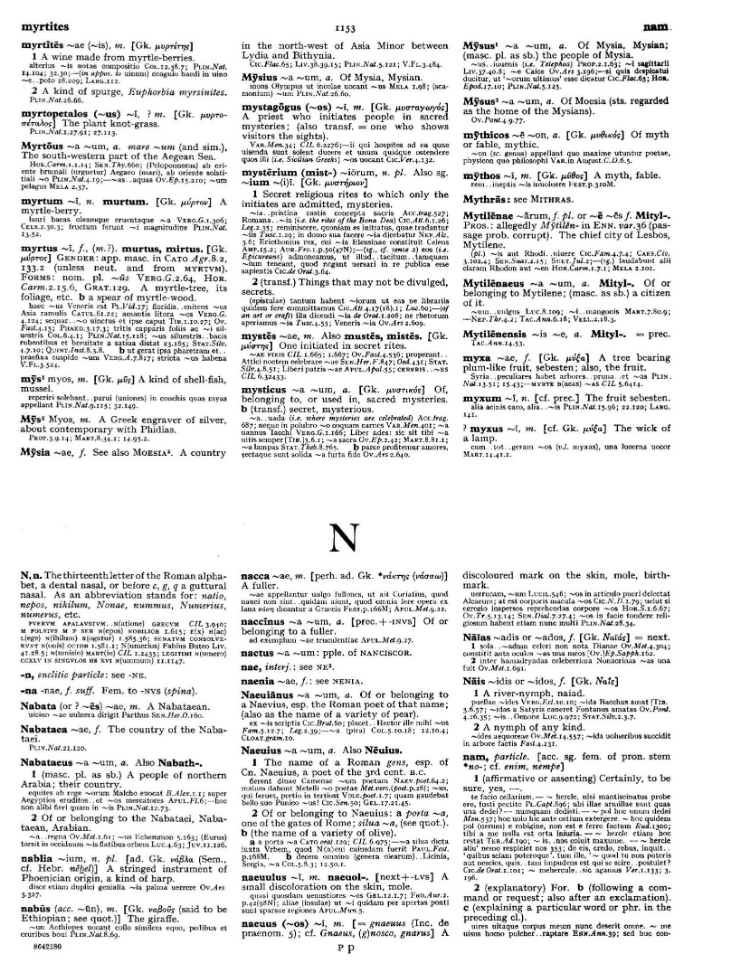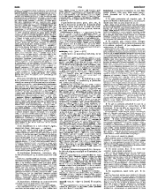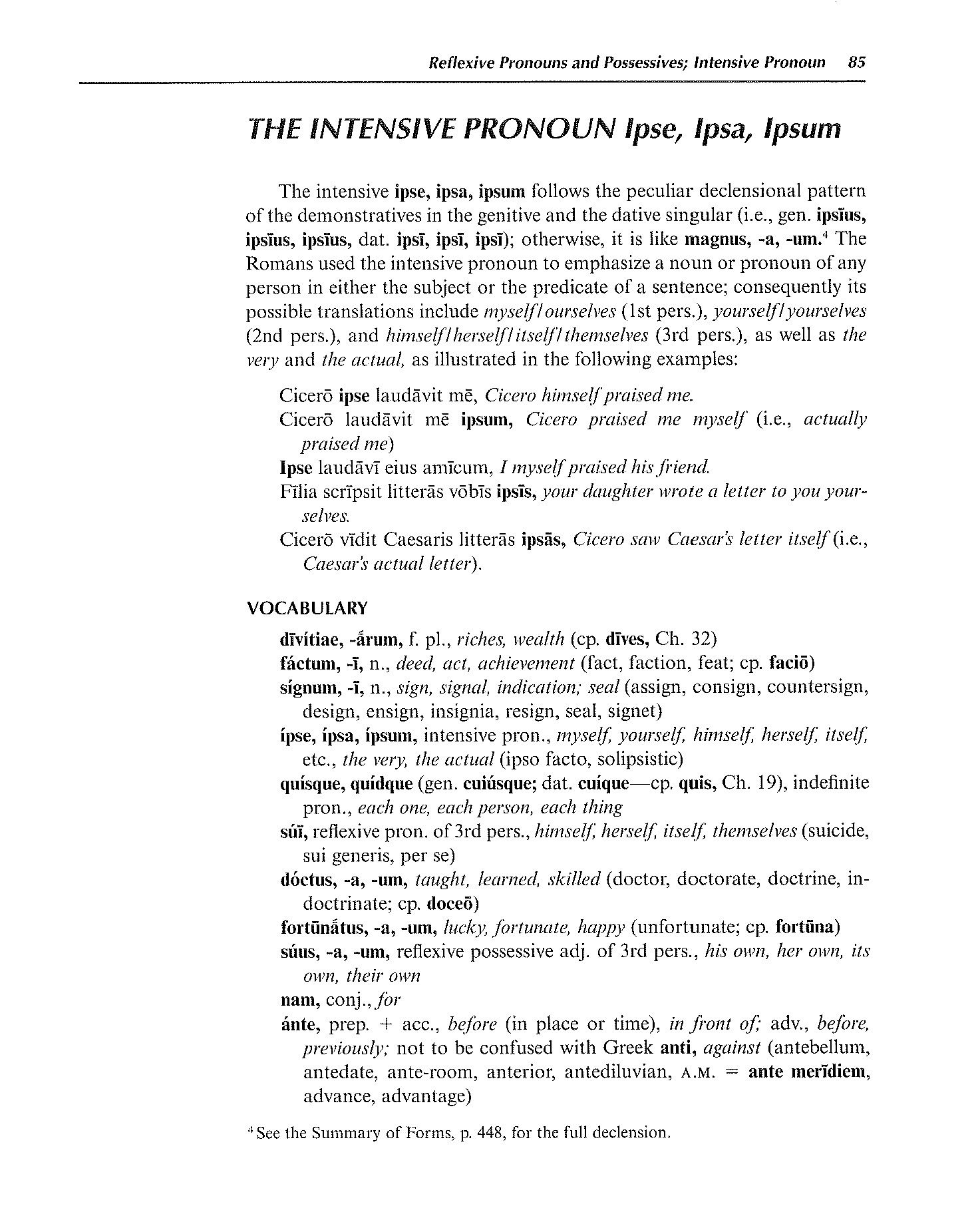
page_listing.tpl
page_subListingDetails.tpl
sub_listingDetails_style1.tpl
sub_listingDetails.title.tpl
nam for
nam is a Latin Conjunction that primarily means for.
Definitions for nam
Wheelock's Latin
Conjunction
- 1
for
Oxford Latin Dictionary
Conjunction
- 1
(affirmative or assenting) Certainly, to be sure, yes -.
- 2
-(explanatory) For. (b) (following a command or request; also after an exclamantion). (c) (explaining a particular word or phr. in the preceding cl.).
- 3
(causal, introducing a proof) For, because. (b) (w. potential subj.) for in that case. (c) (introducing an example or illustration) for instance.
Sentences with nam
Latin to English
Nam illī miserī nunc frūctūs pācis et multum lībertātis sine metū habent.Compare For those unfortunate men now have the fruits of peace and much liberty without fear.
Nam quis potest beātus esse sī aliī hominēs frūctibus pācis lībertātisque carent?Compare For who can be happy if other human beings lack the enjoyments of peace and liberty?
Haec cupimus ut vītam pulchriōrem agāmus; nam pecūnia sōla et imperium possunt hominēs dūrōs facere, ut fēlicēs nōn sint.Compare These things we desire so that we may live a finer life; for money alone and power can make men harsh, so that they are not happy.
Nam castum esse decet pium poetam ipsum, versiculos nihil necesse est, qui tum denique habent salem ac leporem, si sunt molliculi ac parum pudici et quod pruriat incitare possunt, non dico pueris, sed his pilosis qui duros nequeunt movere lumbos.Compare For a poet respectful of the Muses should himself be chaste, but his little verses need not be so. All their salt and elegance comes from being licentious, immodest, suggestive of prurient thoughts - not indeed in children but in hairy old men unable to bestir their numbed loins. [Tr. N.G.]
Ipse igitur propter sui colendus iustitia sum; nam aliter iustitia non sum.Compare Justice therefore is to be cultivated for its own sake; for otherwise it would not be justice.
Nam qui volo, et credo libenter.Compare For we readily believe what we wish.
Data sources
Notes
- Definitions
- Frederick M. Wheelock, Wheelock's Latin, 6th ed., rev. Richard A. LaFleur (New York, NY: HarperCollins Publishers, 2005): 85.
- P. G. W. Glare, Oxford Latin Dictionary, Vols. 1-8 (Oxford: Clarendon Press, 1982): 1153.
- Word frequencies
- Christopher Francese, "Latin Core Vocabulary," Dickinson College Commentaries, last modified 2014, http://dcc.dickinson.edu.
- Paul B. Diederich, The Frequency of Latin Words and Their Endings, PhD diss., (Columbia University, 1939).
- Louis Delatte, Suzanne Govaerts, Joseph Denooz, and Etienne Evrard, Dictionnaire fréquentiel et index inverse de la langue latine [Frequency Dictionary and Inverse Index of the Latin Language] (Liège, Belgium: Laboratoire d'analyse statistique des langues anciennes de l'Université de Liège [L.A.S.L.A.], 1981): 119.
Bibliography
Allen, Joseph H. Allen and Greenough's New Latin Grammar for Schools and Colleges: Founded on Comparative Grammar. Edited by James B. Greenough, George L. Kittredge, Albert A. Howard, and Benjamin L. D'Ooge. Boston, MA: Ginn & Company, 1903.
Crystal, David. A Dictionary of Linguistics and Phonetics. 6th ed. Oxford, UK: Blackwell Publishing, 2008.
Delatte, Louis, Suzanne Govaerts, Joseph Denooz, and Etienne Evrard. Dictionnaire fréquentiel et index inverse de la langue latine [Frequency Dictionary and Inverse Index of the Latin Language]. Liège, Belgium: Laboratoire d'analyse statistique des langues anciennes de l'Université de Liège (L.A.S.L.A.), 1981.
Diederich, Paul B. The Frequency of Latin Words and Their Endings. PhD diss., Columbia University, 1939.
Francese, Christopher. "Latin Core Vocabulary." Dickinson College Commentaries. Last modified 2014. http://dcc.dickinson.edu/latin-vocabulary-list.
Gildersleeve, Basil L., and Gonzales Lodge. Gildersleeve's Latin Grammar: Third Edition, Revised, and Enlarged. 3rd ed. London, England: Macmillan and Co., 1903.
Glare, Peter G.W. Oxford Latin Dictionary. Vols. 1-8. Oxford, England: Clarendon Press, 1982.
Krüger, Bernd. "Latin Conjugation Tables." Cactus2000. Accessed May 5, 2023. https://latin.cactus2000.de/index.en.php.
Pierson, Nick. "Sound of Text." Accessed October 26, 2019. https://soundoftext.com.
Wheelock, Frederick M. Wheelock's Latin. 6th ed. Revised by Richard A. LaFleur. New York, NY: HarperCollins Publishers, 2005.
Wiktionary Contributors. "Victionarium." Wikimedia Foundation, Inc. Updated March 18, 2019. https://la.wiktionary.org/wiki/Victionarium:Pagina_prima.
Citation
Chicago (17th ed.)
Allo Contributors. "nam (conj.) - Latin Word Definition." Allo Latin Dictionary. Last modified . Accessed February 20, 2026. http://ancientlanguages.org/latin/dictionary/nam.
Entry created on . Last updated on .








